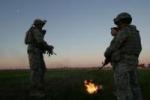This is a classic book that explores why people engage in political violence (riots, rebellion, coups, etc.) and how regimes respond. Though written long before the current rash of insurgencies, it has a lot to say about what is happening in the early 21st century.
In this book, Gurr examines the psychological frustration-aggression theory which argues that the primary source of the human capacity for violence is the frustration-aggression mechanism. Frustration does not necessarily lead to violence, Gurr says, but when it is sufficiently prolonged and sharply felt, it often does result in anger and eventually violence.
Gurr explains this hypothesis with his term "relative deprivation," which is the discrepancy between what people think they deserve, and what they actually think they can get. Gurr's hypothesis, which forms the foundation of the book, is that: "The potential for collective violence varies strongly with the intensity and scope of relative deprivation among members of a collectivity."(p.24)
It is noteworthy that Gurr does not look to a more absolute or objective indicator of deprivation as the source of political violence. People can become inured to a bad state of affairs, even one that offers so little access to life-sustaining resources that members of the group are starving or dying of remediable diseases or exposure.
If, however, there is a significant discrepancy between what they think they deserve and what they think they will get, there is a likelihood of rebellion. Gurr posits this to be the case even if there is no question that their basic needs will be met. The first situation may be a desperate one, but it is the second that is frustrating. And, according to Gurr, just as frustration produces aggressive behavior on the part of an individual, so too does relative deprivation predict collective violence by social groups.
A number of other variables influence the use of violence as well, for example the culture, the society, and the political environment. The culture must at least accept, if not approve, violent action as a means to an end. Political violence is also more likely if the current leadership and/or the socio-economic/political system is seen as illegitimate. Another factor is whether violence is considered to be a viable remedy to the problem.








 ...
...
 . You did bring up an important point. Some (or many) insurgents may be employed during the day in legitimate jobs while working for the insurgency at night. Honestly, I don't know how you would track that figure unless you conducted a survey 10-15 years after hostilities were ceased.
. You did bring up an important point. Some (or many) insurgents may be employed during the day in legitimate jobs while working for the insurgency at night. Honestly, I don't know how you would track that figure unless you conducted a survey 10-15 years after hostilities were ceased.

Bookmarks